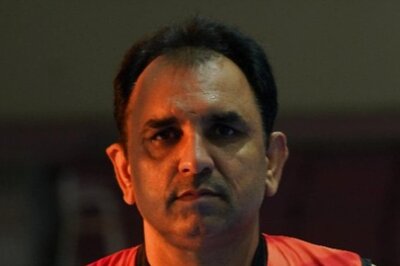
views
Unilever is targeting long-term sales growth of 3% to 5% after a recovery in China and India helped the consumer goods group to gain momentum in the final three months of 2020.
But the company’s emerging market performance in the fourth quarter missed some market expectations, hitting the group’s shares which lost around 4% in early London trading.
Setting out its longer-term targets under Chief Executive Alan Jope, Unilever said on Thursday it would aim for underlying sales growth ahead of its markets, as well as profit growth ahead of sales growth.
Chief Financial Officer Graeme Pitkethly said business in China had normalised in many categories, including in food service, while economic activity in India picked up particularly in the final quarter.
Unilever’s sales in China and India both rose in the high-single-digit percentage range in the fourth quarter, the company’s strongest performing markets in the quarter.
Overall for 2020, sales in emerging markets rose 1.2%, hurt in part by strict lockdowns in the first half of the year and declines in Thailand, the Philippines and in Indonesia in the fourth quarter.
This level of sales growth disappointed analysts.
“Slower EM’s (emerging markets) in Q4 is the root cause of the top line miss to Jefferies estimates, playing out against a background of extended lockdown activity worldwide,” Jefferies analysts wrote in a note. The brokerage expected fourth quarter underlying sales growth of 4.4%.
Developed market sales rose 2.9% in the quarter, driven by strong demand for in-home foods, ice-cream and hygiene products in North America. In Europe, sales were driven by home care products.
The coronavirus pandemic has boosted sales of packaged food companies like Unilever, Nestle and Kraft Heinz, though Unilever has been hit by sharp declines in foods served in public places such as on beaches and at restaurants.
CEO Jope said: “In a volatile and unpredictable year, we have demonstrated Unilever’s resilience and agility through the Covid-19 pandemic.”
It was an historic year for the company which in November ditched its Anglo-Dutch dual-headed structure in favor of a single corporate entity based in London.
The company expects to save 2 billion euros per annum from cost savings programmes and maintain a net debt to underlying EBITDA target of around 2 times.
Fourth-quarter underlying sales rose 3.5%, for the Anglo-Dutch maker of Dove soap, Hellmann’s mayonnaise and Tresemme shampoo, in line with what analysts on average were expecting, based on a company-supplied consensus.
Turnover for the quarter came in at 12.1 billion euros ($14.53 billion), versus analysts’ estimates of 12.16 billion euros. Full-year 2020 turnover came in at 50.7 billion euros, slightly lower than the 50.81 billion euros, analysts had expected.
Adjusted earnings per share for the year was 2.48 euros, one cent lower than analysts’ estimates.
($1 = 0.8328 euros)
Disclaimer: This post has been auto-published from an agency feed without any modifications to the text and has not been reviewed by an editor
Read all the Latest News, Breaking News and Coronavirus News here




















Comments
0 comment